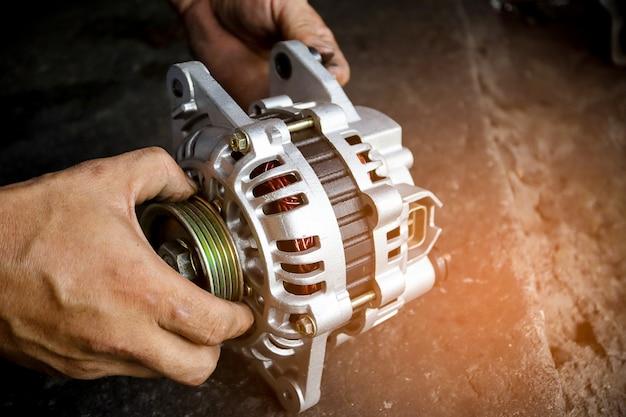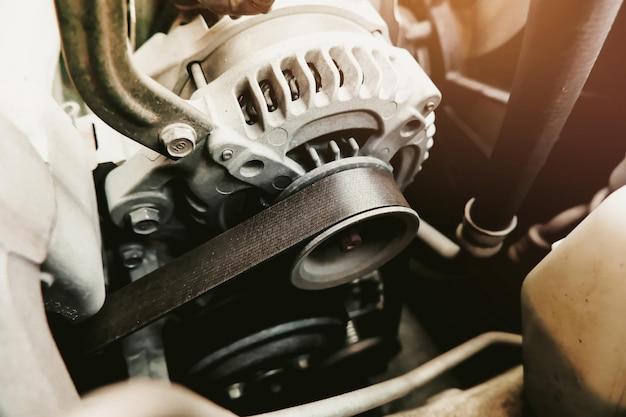An alternator is an important component of a vehicle’s electrical system, responsible for keeping the battery charged and powering the various electrical systems. But have you ever wondered how much power an alternator can actually produce?
In this blog post, we will explore the fascinating world of alternators and delve into questions like how much power they can generate, what determines their output, and whether they can be used for other purposes such as generating electricity for a house or running a wind turbine. We’ll also answer some commonly asked questions like how fast an alternator needs to spin to produce power and whether it operates on AC or DC.
So if you’re curious about the power capabilities of an alternator and its potential applications beyond the realm of automobiles, keep reading! By the end of this post, you’ll have a clear understanding of just how much power an alternator can produce and the possibilities it holds.
How Much Power Does an Alternator Produce
The Basics of Alternator Power: No Smoke and Mirrors Here!
When it comes to the power of an alternator, there are no illusionists performing tricks or smoke and mirrors involved. This subsection will dive into the nitty-gritty details of just how much power an alternator produces, without leaving you scratching your head in confusion.
Let’s Talk Horsepower: The Alternator Edition
Your car’s alternator is like the engine’s dedicated power generator, supplying electricity to charge the battery and keep everything running smoothly. But how much horsepower does it contribute? Well, it’s not going to turn your car into a dragster, but it does play a crucial role.
While the output of an alternator can vary depending on the model, a typical car alternator can generate around 500 to 1,500 watts of power. To put this in perspective, that’s equivalent to about 0.67 to 2 horsepower. Not enough to challenge a race car, but hey, it’s still electricity!
Powering Up the Math: Understanding Voltage and Amperage
To truly grasp the power produced by an alternator, we need to dig into the world of voltage and amperage. Now, don’t let those terms scare you. Think of voltage as the electrical pressure, while amperage is the flow of electricity.
In most vehicles, the alternator produces a steady voltage of around 14.4 volts. And here comes the fun part—let’s unleash some mathematical wizardry! If we divide the wattage (power) by the voltage, we can find the amperage.
So, if we take a 1,000-watt alternator output and divide it by 14.4 volts, we get around 69.44 amps. That’s some serious juice flowing through those cables!
Power to Spare: The Alternator’s Overachieving Side
Now, you may be wondering why an alternator produces more power than your car actually needs. Well, it’s all about covering your back—after all, electrical systems can be power-hungry beasts.
By having an alternator with a higher output capability, it ensures that your car has enough power to handle all the electrical accessories, even in demanding situations. So, whether you’re blasting the AC on a scorching day or jamming out to your favorite tunes, the alternator has got your back.
Don’t Push It to the Limit: Maximum Power Output
While alternators are designed to handle some serious power, they do have their limits. Pushing the alternator beyond its maximum capacity can lead to overheating, premature failure, and an unhappy car.
Typically, most alternators found in everyday vehicles have a maximum power output of around 100 to 150 amps. It’s important to note that exceeding this limit can result in a fried alternator. And trust us, your car won’t be too thrilled about that.
Harnessing the Power of an Alternator
So, now you know the scoop on how much power an alternator can produce. From its small but mighty contribution to horsepower and its vital role in keeping your car’s electrical systems in check, the alternator truly deserves a round of applause.
Next time you turn the key, remember that the alternator is working its magic behind the scenes, keeping your battery charged and your car happily running. After all, who needs smoke and mirrors when you’ve got an alternator powering your journey?
Get Charged Up with Alternator Power!
Now that you have a clearer understanding of the power an alternator can generate, you won’t be left in the dark when it comes to this essential automotive component. From its modest horsepower to its crucial role in keeping your electrical systems alive, the alternator is the unsung hero of your car’s power production. So, the next time you hit the road, give a nod of appreciation to the mighty alternator that keeps things running smoothly. Enjoy the ride, powered by alternator magic!
(Keywords: power of an alternator, how much horsepower does an alternator contribute, voltage and amperage of an alternator, overachieving alternator, maximum power output of an alternator)
FAQ: How Much Power Does an Alternator Produce
In this FAQ-style subsection, we’ll address some common questions related to the power output of alternators. So, let’s dive right in and uncover the answers you’ve been seeking!
How can I obtain 240v from a 120v generator
If you’re dealing with a 120v generator, getting 240v might seem like a challenge. However, fear not! You can actually achieve this by using a device called a step-up transformer. Just connect it to your 120v generator, and voila! You’ll have the voltage boost you need.
What size alternator do I require for 3000 watts
To power 3000 watts, you’ll need an alternator capable of handling this power output. As a general rule of thumb, multiply the desired wattage by 1.25 to account for inefficiency, and then divide the result by the voltage of the alternator. So, for a 12 volt alternator, you’ll need at least a 250 amp alternator to comfortably handle 3000 watts.
Does an alternator produce AC or DC
Believe it or not, an alternator produces alternating current (AC). Despite the name, it doesn’t generate direct current (DC), which is what you typically find in batteries. So, if you’re looking to harness the power of an alternator, keep in mind that you’ll be dealing with AC.
Can an alternator run 24/7
Just like humans, alternators need some shut-eye too! Running an alternator continuously without proper rest can lead to overheating and premature failure. It’s best to give your alternator some downtime for cooling off and maintenance, rather than pushing it to work non-stop.
How fast does a car alternator need to spin to produce power
Car alternators are pretty efficient at low speeds, but they need to reach around 2,400 to 3,000 revolutions per minute (RPM) to start producing power. So, next time you’re revving up your engine, remember that your alternator needs to keep pace to generate that sweet electrical energy.
How much horsepower does it take to run a 200 amp alternator
Running a 200 amp alternator might sound like it needs a lot of muscle, but in reality, it doesn’t require an enormous amount of horsepower. Typically, a 200 amp alternator needs around 2 to 2.5 horsepower from the engine to operate efficiently.
Can a car alternator power a house
While it might seem tempting to give your house a cool car makeover, unfortunately, a car alternator isn’t designed to power an entire house. Car alternators are specifically built to meet the electrical demands of vehicles, not houses. So, it’s best to stick with alternate power sources for your home.
Is it possible to hand crank an alternator
Sure, you can try to give your arm a workout by hand cranking an alternator, but don’t expect it to produce a substantial amount of power. Alternators are primarily designed to be driven by an engine’s mechanical power, so manually spinning it won’t generate much electrical energy.
How much power can an alternator produce when used as a motor
When an alternator is used as a motor, its power output depends on the specific alternator. However, in general, alternators are not optimized for motor functionality. If you’re looking for a motor to power your machinery, it’s best to explore dedicated electric motor options.
How many amps does a 12-volt alternator put out
A 12-volt alternator typically puts out around 60 to 120 amps. The exact amperage varies depending on the alternator’s size and design. So, if you need a higher amp output, you might want to consider upgrading to a higher capacity alternator.
Can an alternator produce 240 volts
No, an alternator cannot directly produce 240 volts. Alternators are built to provide voltage in line with the vehicle’s electrical system, which is typically 12 volts. If you want to obtain 240 volts, you’ll need to use a combination of transformers and other devices to step up the voltage.
What’s the maximum wattage a 120-amp alternator can handle
A conservative estimate for a 120-amp alternator would be around 1440 watts, assuming a 12-volt output. However, it’s important to note that alternators have different efficiency ratings, so the actual wattage could be slightly higher or lower depending on the alternator’s efficiency.
Can I create a wind turbine using an alternator
Absolutely! Alternators can be repurposed to harness the power of the wind and generate electricity. By attaching blades to the alternator’s rotor shaft, the wind’s force can spin the rotor, producing electricity. So, if you have a spare alternator lying around, why not channel your inner wind wizard?
How many kilowatt-hours does a car alternator produce
Car alternators are not specifically designed to produce kilowatt-hours as a standalone measure. They generate electrical energy as needed to power the vehicle’s electrical systems, rather than accumulating it over time. So, if you’re tracking electrical consumption, you might need to explore alternative measurement methods.
How much power does an alternator produce at idle
At idle speed, an alternator typically generates around 20 to 50 amps, depending on its capacity. However, it’s worth noting that the power output increases with higher RPM, so don’t let your engine nap for too long if you need that extra electrical juice.
What’s the minimum RPM requirement for a 12-volt car alternator
To start producing power, a 12-volt car alternator generally needs to operate above idle speed, typically around 800 to 1,200 RPM. Below this threshold, the alternator may not generate enough rotational force to produce a significant electrical output.
Can an alternator power an inverter
Absolutely! Alternators and inverters are often a perfect power pair. Alternators provide the necessary electrical energy, while inverters convert it into the desired AC power output. So, if you’re looking to harness your alternator’s power for household appliances, an inverter is your trusty sidekick.
How many volts does an alternator produce
Most car alternators generate around 13.5 to 14.5 volts, which is commonly referred to as the vehicle’s charging voltage. This voltage is regulated to ensure proper operation of the vehicle’s electrical systems and to charge the battery.
Can I use an alternator to generate electricity
Absolutely! Alternators are commonly used to generate electricity in various applications. From backup power systems to off-grid setups, alternators can be a reliable source of electrical energy. Just keep in mind that proper electrical regulations and safety precautions should be followed when utilizing an alternator in this way.
That wraps up our enlightening FAQ section on the power production of alternators. Hopefully, we’ve uncovered the answers you were seeking, along with a sprinkle of humor on the side. If you have any lingering questions, feel free to reach out and keep the alternator-powered conversation alive!

